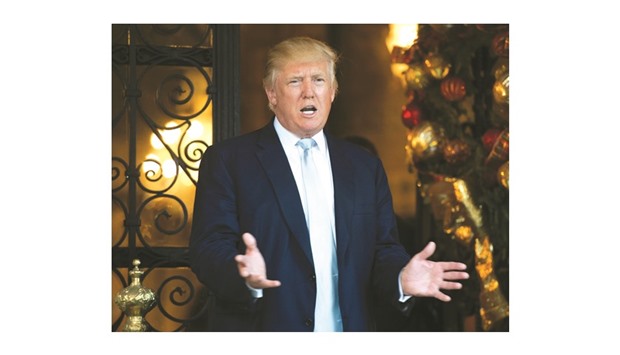Guessing what the world will look like in the Trump era is a risky game. A President Donald Trump has no governing track record, and his campaign was full of contradicting policies and statements that make only one thing certain: Unpredictability.
Surprise is an element that Trump relishes both in deal-making and, already as PEOTUS, in policy. America and the world need to get ready for a wild ride.
During the first 100 days, it is safe to expect a series of surprise moves. On the one hand, his opponents will question his presidency’s legitimacy, conflicts of interest and seeming disregard for governing institutions. On the other hand, startling shifts will also come from a White House manically pitching and tweeting new domestic and foreign policy directions.
Leaving aside domestic considerations, the world must anticipate and understand the potentially dramatic geopolitical shifts coming in the new Trump world order. Trying to divine Trump’s new foreign policy priorities might be a fool’s errand, but there are enough data points to guess at his global game of building and strengthening alternative alliances.
Russia, of course, tops the list. But improved relations with the autocratic Vladimir Putin might be just a piece of a much larger real-world RISK! game. Trump will try to put President Barack Obama’s foreign policy – one that tried to balance America’s interests and values – into Chapter 11 and start anew.
Defending and promoting liberal democratic values and human rights has been an important part of modern US foreign policy. Obama continued the bipartisan act of using development, diplomacy and defence to advance these values globally, albeit with uneven success. It was always assumed that if America did good, America would do well.
Early indications are that values promotion will drop to the bottom of the foreign policy agenda and take a backseat to America’s commercial and strategic material interests, and that those interests are actively being redefined (and retweeted) as the nation races toward Inauguration Day. Values will play some role, of course, but only insofar as they cost nothing or can be leveraged as negotiating deal points.
If a nation wants better trade conditions or visa rules with the US, well, then concerns about that nation’s human rights abuses or authoritarian regime could be overlooked or dealt away for a better commercial deal or investment advantage. Expect this to be part of the new diplomacy and future alliance structure.
Big picture, however, is where everything is about to flip.
America’s superpower status is about to be overhauled into a strategic role as the world’s leading petropower. Leveraging American preponderance in defence and her energy production primacy will make the still economically diverse US a supremely fortified petrostate. Energy will be leveraged to define how Trump and his team select global alliances and regional adversaries. Global energy security could be the simple and singular operating principle that allows him to partner with Russia and contain China.
Such a bold and risky approach is fraught with danger and could easily backfire, but the elements for pursuing such an “energy first” policy are already falling into place. The Trump-Putin bromance will allow America to become Russia’s BFF, especially if Moscow is slowly willing to turn its back on Beijing, where there is no love lost. China is highly dependent on Russian and Middle Eastern imported energy supplies.
Combine the energy pressure with more independence-minded Taiwan, a slowly reinvigorating and muscular Japan, a potentially re-stabilised South Korea, and an America-reoriented Philippines and the stage will be set for a full Chinese containment policy that aggressively reinforces an understanding that Beijing’s fake islands and forward military posture will be addressed forcefully. Yes, a dangerous game of chicken is shaping up during this lame duck period. And Russia is key to the strategy.
The recent expulsions of Russian diplomats and spies, serious election (and ongoing) hacking and the GOP’s traditional antipathy toward Moscow – and especially Putin – only gives Trump and his Secretary of State nominee, energy executive Rex Tillerson, more leverage for a better deal. Ultimately, a Trump administration may cede recognition of Crimea, halt economic sanctions, and arrive at a modern-day Yalta II agreement over sovereignties and spheres of influence.
But such a deal could also create a “Finlandised” Ukraine, a weakened Nato presence and role in former Soviet captive nations, and potentially an eerily reminiscent non-aggression pact in Europe that permits the circumstances for the European Union to continue to collapse. Europe’s leaders might feel intimidated and abandoned by such a bold Russian-American alliance, but assured enough to deal directly with Putin’s Russia in the short run. On the plus side, Europeans might figure out a way to axe autocrats and populists and, instead, bring back liberal democratic leaders.
Russian detente and partnership is all a little bit weird to think about in 2017, but so was Richard Nixon’s opening to China a few decades ago – done back then in part to help pressure and contain the Soviet Union. Risky.
January 20 will bring about not only a change in presidential style. Inauguration Day will probably usher in a new era where the Trump administration defines America’s leading role in the world not by its deep adherence to and global promotion of democratic civil society and the rule of law, but by an energetically raw realist faith and practice in power over principle. Or not. It’s anybody’s guess.

Donald Trump
